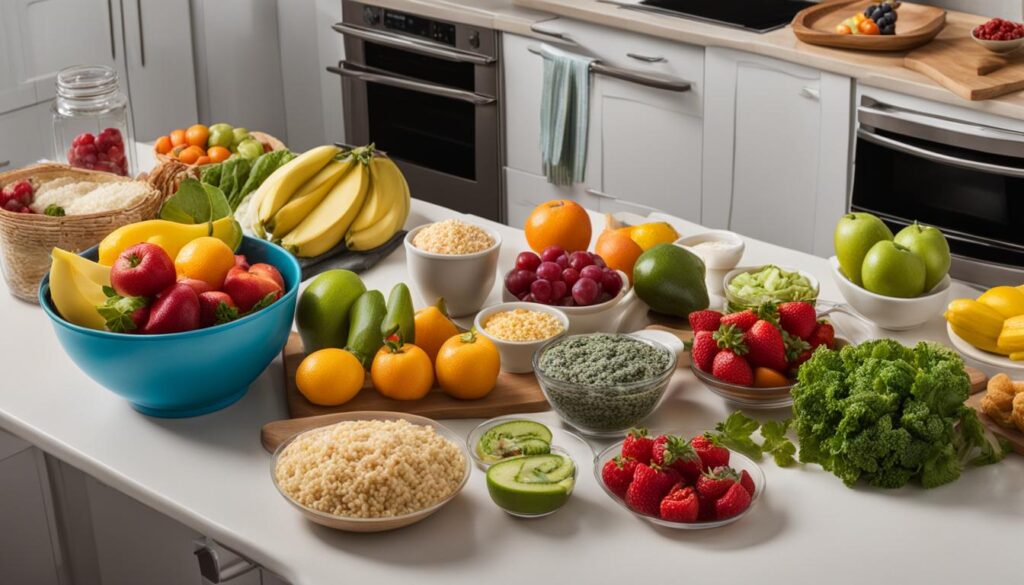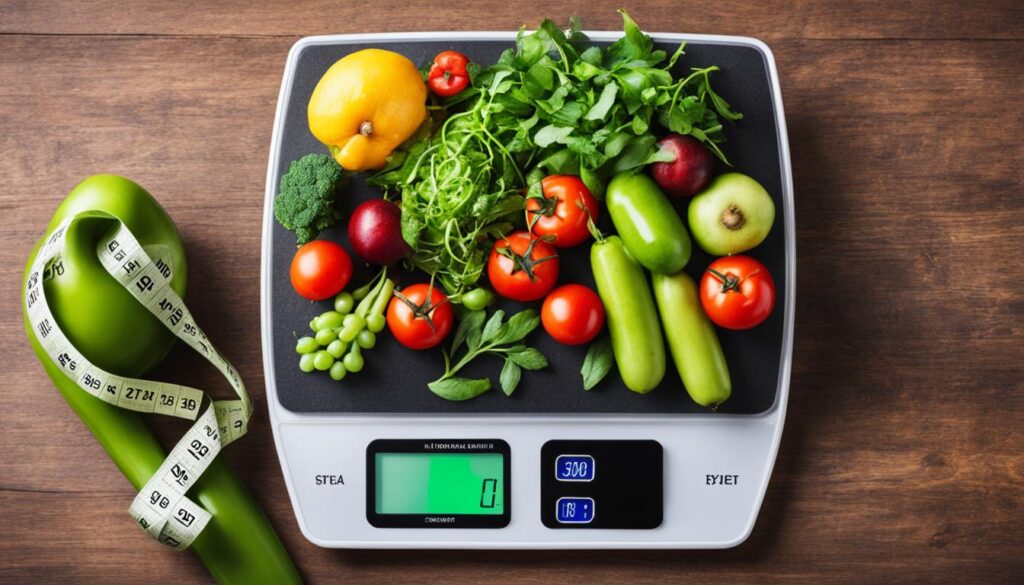When it comes to long-term weight loss, behavior modification is the key to success. This approach focuses on making sustainable lifestyle changes that support healthy behavior patterns. By adopting various strategies and techniques, individuals can create a healthier and more sustainable lifestyle, leading to successful weight management in the long run.
Key Takeaways:
- Behavior modification is essential for long-term weight management.
- Creating a realistic exercise routine is crucial for sustainable weight loss.
- Developing a healthy nutrition plan is important for successful weight management.
- Recording habits and activities helps monitor progress and identify areas for improvement.
- Controlling the home and other environments supports healthy behaviors and promotes weight loss.
Create a Realistic Exercise Routine
Developing a consistent and well-rounded exercise routine is essential for sustainable weight loss. It not only helps burn calories but also relieves stress, tones muscles, and improves overall physical health. When creating an exercise routine, it’s crucial to consider personal goals, preferences, and current fitness level. By setting realistic goals and gradually increasing the intensity and duration of workouts over time, individuals can maximize their weight loss journey.
An effective exercise routine should incorporate a variety of activities to engage different muscle groups, prevent boredom, and optimize results. Some examples of exercises that can be included are:
- Aerobic exercises such as brisk walking, jogging, cycling, or swimming for cardiovascular health.
- Strength training exercises like weightlifting or bodyweight exercises to build and tone muscles.
- Flexibility and stretching exercises such as yoga or Pilates to improve mobility and prevent injuries.
- Functional exercises that mimic everyday movements to enhance overall fitness and functionality.
Remember, consistency is key when it comes to reaping the benefits of regular exercise. Aim for at least 150 minutes of moderate-intensity aerobic activity or 75 minutes of vigorous-intensity aerobic activity every week, along with strength training exercises on two or more days. However, it’s important to listen to your body and adjust the routine according to your abilities, limitations, and any existing medical conditions.
Here is an example of a weekly exercise routine that can be customized depending on individual needs:
| Day | Activity | Duration |
|---|---|---|
| Monday | Brisk walk or jog | 30 minutes |
| Tuesday | Strength training (upper body) | 30 minutes |
| Wednesday | Yoga or Pilates | 30 minutes |
| Thursday | Cardio exercise (cycling or swimming) | 30 minutes |
| Friday | Strength training (lower body) | 30 minutes |
| Saturday | Rest day | – |
| Sunday | Functional exercises | 30 minutes |
Remember to consult with a healthcare professional or certified fitness trainer before starting any new exercise program, especially if you have any underlying health conditions or concerns.
Develop a Healthy Nutrition Plan

A healthy nutrition plan is crucial for sustainable weight loss. By consuming nourishing foods in appropriate portion sizes, individuals can support their weight management journey and improve their overall health. When planning meals, there are several key strategies to consider:
- Focus on Homemade Meals: Cooking meals at home allows individuals to have better control over the ingredients used and portion sizes. It promotes a more mindful approach to eating and reduces reliance on processed and unhealthy food options.
- Pay Attention to Portion Sizes: Understanding appropriate portion sizes is essential for maintaining a healthy weight. Using measuring cups, a kitchen scale, or visual references can help individuals gauge their food intake accurately.
- Aim for Food Variety: Incorporating a variety of nutrient-dense foods is crucial for obtaining all essential nutrients. Including fruits, vegetables, whole grains, lean proteins, and healthy fats in the diet ensures a balance of vitamins, minerals, and antioxidants.
In addition to these strategies, keeping a food diary or using a calorie tracker can further enhance the effectiveness of a healthy nutrition plan. Writing down or tracking food intake allows individuals to become more mindful of their eating habits and identify areas for improvement. It provides a clear picture of calorie consumption and can help in making necessary adjustments to achieve sustainable weight loss.
Remember, a healthy nutrition plan is not about strict diets or deprivation but rather about nourishing the body with nutrient-rich foods in a balanced manner.
| Benefits of a Healthy Nutrition Plan | Key Considerations |
|---|---|
| Promotes sustainable weight loss | Focus on homemade meals |
| Improves overall health and well-being | Pay attention to portion sizes |
| Provides essential nutrients | Aim for food variety |
| Enhances energy levels and vitality | Track food intake with a food diary or calorie tracker |
Record Your Habits and Activities
Keeping a record of habits and activities is an effective way to monitor progress and identify areas for improvement. By recording specific meals, workouts, and calorie intake, I gain a better understanding of my behaviors and can make necessary adjustments to support my weight management journey.
Journaling my meals allows me to see patterns in my eating habits and identify potential triggers for overeating or unhealthy choices. It helps me track my food intake and make more mindful decisions about what and how much I eat. Additionally, recording my workouts helps me stay on track with my exercise routine and ensures I am consistently engaging in physical activity to support sustainable weight loss.
Calorie intake tracking is another valuable habit to adopt. By keeping a record of the calories I consume, I can easily monitor my daily intake and make adjustments as needed. It’s a powerful tool for understanding the impact of certain foods on my overall calorie balance.
Tracking habits and activities creates awareness and accountability. It allows me to see my progress and identify areas where I can improve. It’s like having a personal record of my journey towards sustainable weight loss.
It’s important to choose a method of recording that works best for me. Some people prefer traditional pen and paper journals, while others find smartphone apps or online trackers more convenient. Whichever method I choose, the key is to be consistent and honest in recording my habits and activities.
By regularly recording my habits and activities, I can make informed decisions and adjust my strategies to achieve sustainable weight loss. It brings clarity to my behaviors, helping me recognize areas of strength and areas that need improvement. With this valuable insight, I am better equipped to make lasting changes and reach my weight management goals.
Control Your Home Environment

Creating a conducive home environment is crucial for sustainable weight loss. By modifying your home environment, you can eliminate temptations and establish an atmosphere that promotes healthy behaviors. Here are some strategies to help you control your home environment:
- Keep Tempting Foods Out of the House: Remove unhealthy snacks and sugary treats from your pantry and refrigerator. Stock your kitchen with nutritious options, such as fruits, vegetables, and whole grains.
- Avoid Distractions While Dining: Turn off the TV and put away electronic devices during meal times. By focusing on your food and savoring each bite, you can prevent overeating and make healthier choices.
- Use Smaller Dishes: Opt for smaller plates and bowls to control portion sizes. Research shows that people tend to eat less when their food is served on smaller plates.
- Prioritize Stress Management and Relaxation: Stress can lead to emotional eating and unhealthy food choices. Incorporate stress-reducing activities into your daily routine, such as meditation, yoga, or spending time outdoors.
By implementing these strategies, you can create an environment that supports your weight loss goals and makes it easier to maintain a healthy lifestyle.
| Benefits of Controlling Your Home Environment | Strategies |
|---|---|
| Reduces the likelihood of making impulsive food choices | Keep tempting foods out of the house |
| Promotes mindful eating and portion control | Avoid distractions while dining, use smaller dishes |
| Supports stress management and emotional well-being | Prioritize stress management and relaxation |
Control Other Important Environments

In addition to the home environment, it’s crucial to modify behavior in various settings to support sustainable weight loss. By controlling these important environments, we can reinforce healthy behaviors and promote long-term weight management.
Keep Healthy Snacks On Hand
When hunger strikes, having healthy snacks readily available is essential for staying on track with your weight loss journey. Stock up on portable options such as fruits, nuts, or granola bars, so you can make nutritious choices even when you’re on the go.
Stay Hydrated
Drinking an adequate amount of water throughout the day is vital for maintaining overall health and supporting weight loss efforts. Hydration can help curb cravings, boost metabolism, and promote a feeling of fullness. Remember to carry a water bottle with you and make it a habit to drink water regularly.
Find Opportunities for Movement
Being physically active is crucial for sustainable weight loss. Look for opportunities to incorporate movement throughout your day, such as taking short walks, using stairs instead of elevators, or stretching during breaks. Small, consistent changes can make a significant difference in your overall activity level.
Eat a Small Amount of Healthy Food Before Social Gatherings
Before attending social gatherings or events, try eating a small, balanced meal or snack to curb excessive hunger. By doing so, you’re less likely to overindulge in unhealthy food options and can make more mindful choices when faced with temptations.
Effectively Manage Stress
Stress can often trigger emotional eating or cravings for unhealthy foods. It’s crucial to find effective stress management techniques that work for you, such as practicing mindfulness, engaging in hobbies, or seeking support from loved ones. By managing stress effectively, you can avoid using food as a coping mechanism and support your weight management efforts.
| Control Other Important Environments | Benefits |
|---|---|
| Keep Healthy Snacks On Hand | – Curbing hunger cravings\n- Making nutritious choices |
| Stay Hydrated | – Curbing cravings\n- Boosting metabolism\n- Promoting a feeling of fullness |
| Find Opportunities for Movement | – Increased physical activity\n- Boosted calorie burn |
| Eat a Small Amount of Healthy Food Before Social Gatherings | – Avoiding overindulgence\n- Making mindful choices |
| Effectively Manage Stress | – Prevention of emotional eating\n- Removal of coping mechanism |
Weight Management Tips from Experts

When it comes to sustainable weight loss, experts have identified several behavior modification techniques that can make a significant difference. By implementing these strategies into your daily routine, you can enhance your chances of achieving long-term success in managing your weight.
1. Journaling Food Intake and Progress
Keeping a food journal can help you track what you eat and identify patterns or triggers that may lead to overeating. By recording your food intake and progress, you can gain valuable insights into your eating habits and make necessary adjustments to support your weight management goals.
2. Setting Realistic Goals
Setting realistic and achievable goals is crucial for sustainable weight loss. Start by breaking down your ultimate goal into smaller milestones that are measurable and attainable. This will help you stay motivated and focused on your progress.
3. Finding Alternative Activities to Distract from Food Cravings
When cravings strike, it’s important to have alternative activities to turn to instead of reaching for unhealthy snacks. Engage in hobbies, go for a walk, or practice relaxation techniques to divert your attention away from food cravings.
4. Stocking the Kitchen with Healthy Options
Keep your kitchen stocked with nutritious foods that align with your weight management goals. Having a wide variety of healthy options readily available can make it easier to make wise food choices and avoid unhealthy temptations.
5. Learning New Cooking Skills
Expand your cooking repertoire by learning new recipes and techniques that emphasize healthy ingredients and preparation methods. By experimenting with new flavors and dishes, you can make healthier eating an enjoyable and sustainable habit.
6. Implementing Strategies for Eating Out at Restaurants
Eating out at restaurants can be challenging when trying to manage your weight. However, by planning ahead, reviewing menus in advance, and making mindful choices, you can still enjoy dining out while supporting your weight loss goals.
By incorporating these behavior modification techniques into your daily life, you can optimize your chances of achieving sustainable weight loss. Remember, consistency is key, and even small changes can make a significant impact on your overall well-being.
Changing Habits for Permanent Weight Loss

Changing habits is essential for achieving permanent weight loss. It requires a shift in mindset and the adoption of behavior change techniques that promote self-control and sustainable lifestyle choices.
When it comes to behavior change, it’s important to dismiss self-defeating thoughts and behaviors that hinder progress. Instead, focus on adopting positive habits that support long-term weight management.
One effective strategy is to make changes gradually, focusing on one habit at a time. This allows for a smoother transition and increases the likelihood of success. By setting realistic goals and making small adjustments over time, individuals can create lasting habits that contribute to permanent weight loss.
Self-monitoring is another powerful tool for behavior change. By keeping track of food intake, exercise habits, and progress, individuals gain valuable insights into their behaviors and can make necessary adjustments to support their weight management journey.
“The key to permanent weight loss lies in making meaningful behavior changes and creating new habits that support a healthy lifestyle.”
Rewards for progress can also be an effective motivator. Celebrating milestones and accomplishments along the way not only boosts morale but also reinforces positive behaviors. Remember, rewards don’t have to be food-related; they can be non-food rewards that are equally satisfying and meaningful.
Lastly, prioritizing self-care is crucial for sustaining permanent weight loss. Taking care of oneself physically, mentally, and emotionally helps create a strong foundation for healthy habits. This includes getting enough sleep, managing stress effectively, and finding enjoyable ways to stay active.
By implementing these behavior change techniques and focusing on permanent weight loss, individuals can overcome obstacles, adopt healthier habits, and achieve long-lasting success in their weight management journey.
Behavior Change Techniques for Permanent Weight Loss
| Technique | Description |
|---|---|
| Gradual Change | Make small adjustments over time to create sustainable habits. |
| Self-Monitoring | Track food intake, exercise habits, and progress for self-awareness and accountability. |
| Rewards for Progress | Celebrate milestones and accomplishments to reinforce positive behaviors. |
| Self-Care | Prioritize physical, mental, and emotional well-being for a strong foundation. |
Conclusion
Behavior modification plays a pivotal role in achieving sustainable weight loss and managing weight in the long term. By adopting effective behavior change strategies and techniques, individuals can make lasting lifestyle changes that support healthy habits and promote successful weight management.
Approaching weight management as a lifelong journey is key. Gradual changes, self-monitoring, and self-care are essential components of this process. By gradually implementing behavior modification techniques, individuals can develop healthier eating habits, adopt regular exercise routines, and create a supportive environment that facilitates sustainable weight loss.
With the right mindset and commitment, behavior modification can lead to not only sustainable weight loss but also improved overall health. Making conscious choices to prioritize nutrition, exercise, and self-care empowers individuals to take control of their weight management journey and make lasting positive changes.
By incorporating behavior modification techniques into their everyday lives, individuals can transform their habits and create a healthier lifestyle that supports sustainable weight loss. Remember, it is the small, consistent changes that make the biggest difference in the long run.
Source Links
- https://www.ncbi.nlm.nih.gov/pmc/articles/PMC4772897/
- https://www.webmd.com/obesity/features/behavioral-tips-successful-weight-loss
- https://www.yourweightmatters.org/weight-management-behavior-modification/




